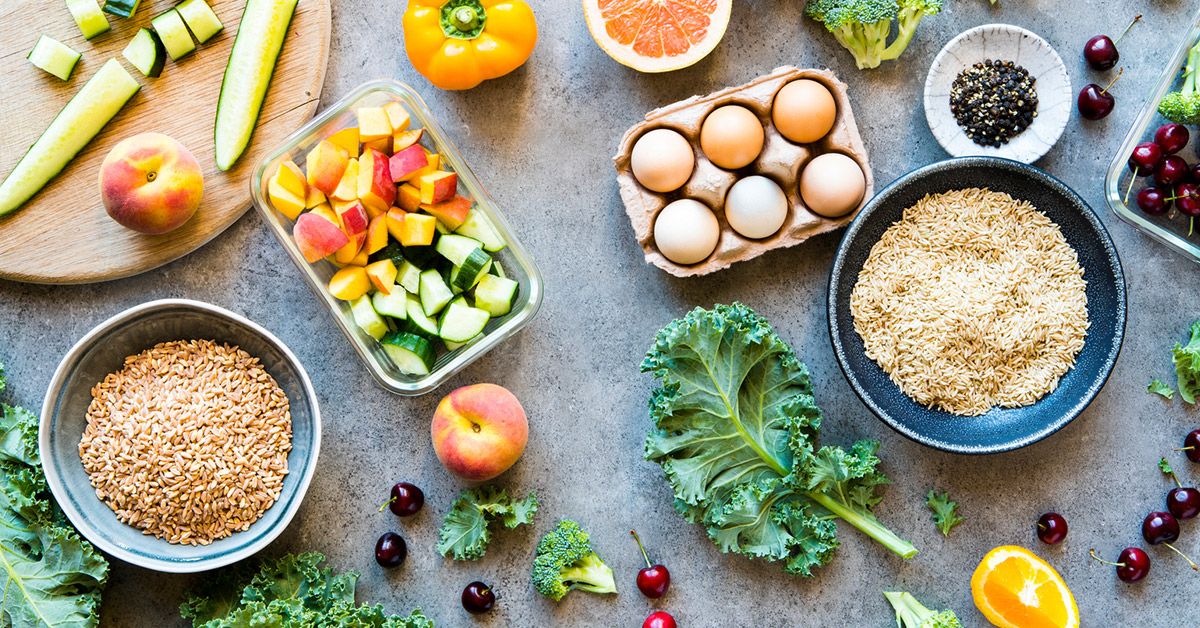Mouthwatering BBQ Sauces That Pair Perfectly with Vegan Proteins
Mouthwatering BBQ Sauces That Pair Perfectly with Vegan Proteins
Blog Article
Everything About Healthy Food: Advantages of Enjoying Plant Based Alternatives
The discussion bordering plant-based diets has obtained substantial focus in the last few years. Many individuals are checking out the prospective health benefits, dietary advantages, and ecological impacts linked with these dietary selections. As individuals become a lot more aware of their food's impact on well-being and sustainability, concerns emerge concerning the usefulness of adopting such a way of life. What particular changes can one anticipate, and exactly how might these choices improve not only personal wellness but likewise the world's future?
Recognizing Plant-Based Diet Plans
Although several people connect plant-based diets mainly with vegetarianism or veganism, these diets can include a vast variety of consuming patterns that focus on whole, minimally refined plant foods. Such diets often include fruits, vegetables, entire grains, seeds, legumes, and nuts, while removing or restricting pet products. This adaptability allows individuals to tailor their nutritional options according to personal preferences and dietary demands. Some may take on a mostly plant-based diet regimen while still sometimes consuming meat or dairy, usually described as a flexitarian technique. The emphasis continues to be on integrating even more plant foods, which can bring about a diverse array of tastes and meals. Recognizing these different analyses of plant-based eating is necessary for appreciating its accessibility and allure in modern food society.
Health Advantages of Plant-Based Foods
The wellness benefits of plant-based foods are considerable, offering a nutrient density advantage that sustains total health. Research suggests that these foods can boost heart wellness and play a necessary role in reliable weight administration. By integrating more plant-based options, individuals might boost their dietary options and promote lasting wellness.
Nutrient Density Advantage
Nutrient density plays an essential duty in the wellness advantages of plant-based foods, making them an engaging choice for those looking for a balanced diet plan. Plant-based foods, such as fruits, vegetables, vegetables, nuts, and entire grains, are frequently abundant in crucial vitamins, minerals, and antioxidants while being lower in calories. This high nutrient density enables people to eat fewer calories while still satisfying their nutritional demands. Additionally, these foods are packed with dietary fiber, promoting digestive wellness and aiding in weight management. By incorporating nutrient-dense plant-based choices, customers can boost their total health, sustain their immune systems, and decrease the danger of persistent conditions. Ultimately, the nutrient thickness of plant-based foods emphasizes their relevance in a health-conscious lifestyle.
Heart Wellness Enhancement

Weight Administration Support
Along with advertising heart health, a plant-based diet can significantly assist in weight administration. This nutritional strategy emphasizes entire foods such as fruits, veggies, legumes, nuts, and whole grains, which are normally reduced in calories and higher in fiber compared to animal-based items. The high fiber content helps boost satiation, lowering overall calorie intake. Moreover, plant-based diet plans are frequently rich in crucial nutrients while reduced in unhealthy fats, making it simpler to maintain a healthy weight. Gluten Free BBQ Sauce. Research study suggests that people who adopt a plant-based way of living tend to have reduced body mass indexes (BMIs) and experience even more successful weight management compared to those that eat meat-heavy diet plans. Subsequently, welcoming plant-based choices is a critical choice for effective weight monitoring
Nutritional Value of Plant-Based Active Ingredients
Plant-based ingredients are abundant in vital nutrients, using a diverse range of vitamins, minerals, and antioxidants that contribute to overall health and wellness. A comparison of healthy protein sources reveals that while pet items are often deemed exceptional, many plant-based choices give sufficient healthy protein and other helpful substances. Comprehending the nutritional value of these components can aid people make notified dietary options.
Crucial Nutrients in Plants
Nutrient-rich active ingredients found in plants provide a varied selection of necessary nutrients that add significantly to overall health. These ingredients are abundant in vitamins A, C, and K, which support immune function, vision, and blood clotting, specifically. On top of that, plants supply crucial minerals such as calcium, potassium, and magnesium, important for heart health, muscular tissue feature, and bone stamina. The visibility of fiber in plant-based foods aids food digestion and advertises a healthy gut microbiome. Antioxidants, discovered perfectly in fruits and vegetables, aid combat oxidative anxiety and lower swelling. Several plant foods are low in calories yet high in nutrients, making them an exceptional selection for those seeking to preserve a healthy and balanced weight while guaranteeing suitable nutrient consumption.

Contrasting Healthy Protein Sources
Protein resources differ considerably in their nutritional accounts, with plant-based components supplying unique benefits. Unlike animal healthy proteins, which frequently consist of saturated fats and cholesterol, plant healthy proteins often tend to be reduced in these undesirable components. Legumes, nuts, seeds, and whole grains are abundant in vital amino acids, fiber, vitamins, and minerals. For example, lentils provide high protein web content together with considerable iron and folate, while quinoa is a full healthy protein, providing all nine necessary amino acids. In addition, plant-based healthy proteins are often come with by antioxidants and phytochemicals that support general health. The shift to plant-based protein sources not just improves nutritional consumption however additionally straightens with sustainable nutritional techniques, minimizing ecological influence and promoting lasting health and wellness advantages.
Environmental Impact of Plant-Based Consuming
As awareness of climate adjustment grows, several individuals are exploring lasting dietary choices that can greatly minimize their ecological footprint. Plant-based eating has actually become a considerable factor to lowering greenhouse gas exhausts, which are mostly connected with livestock production. The farming of fruits, grains, vegetables, and vegetables commonly needs less sources, such as water and land, compared to animal farming. Additionally, plant-based diet plans can cause reduced deforestation, as less land is required for grazing animals or expanding pet feed. By changing towards plant-based options, customers can sustain biodiversity and promote healthier ecosystems. On the whole, embracing plant-based eating not just advantages personal wellness however also stands for an essential step towards ecological sustainability and conservation initiatives.
Conquering Common Misconceptions
While numerous people recognize the benefits of a plant-based diet plan, several false impressions commonly hinder them from fully accepting this way of living. A common belief is that plant-based diet regimens do not have adequate healthy protein; nonetheless, countless plant sources, such as legumes, nuts, and tofu, supply adequate protein. Furthermore, some presume that this diet regimen is costly, when actually, staples like beans, rice, and seasonal vegetables can be rather inexpensive. An additional false impression is that plant-based eating is extremely limiting, whereas it in fact uses a diverse range of flavors and foods. Lots of stress that a plant-based diet regimen may lead to shortages, yet with correct preparation, people can get all needed nutrients, consisting of vitamins and minerals, while enjoying a large range of delicious meals. Vast Tips for Transitioning to a Plant-Based Lifestyle
Making the change to a plant-based way of living can be an enriching experience, though it often requires some assistance to navigate the preliminary modifications. People are urged to start progressively, including even more fruits, vegetables, vegetables, and entire grains into their meals while lowering meat and dairy products intake. Dish planning is vital; preparing a regular menu can help ease the adjustment and protect against final harmful choices. Checking out brand-new dishes and cooking approaches can additionally keep and boost the experience exhilaration about plant-based consuming. Additionally, signing up with support groups or areas can provide inspiration and share beneficial pointers. Lastly, remaining notified about nutrition guarantees well balanced dishes, stopping shortages while fostering a healthy and balanced, enjoyable plant-based lifestyle.
Delicious Plant-Based Meal Concepts
Discovering scrumptious plant-based meal ideas can inspire individuals to embrace a much more nourishing diet. One popular option is a passionate quinoa salad, including cherry tomatoes, cucumber, and a tangy lemon-tahini dressing. An additional fave is a mouthwatering lentil stew, loaded with carrots, celery, and aromatic natural herbs, best for a comforting dinner. For morning meal, over night oats made with almond milk, chia seeds, and covered with fresh berries give a nourishing begin to the day. Additionally, a vibrant vegetable stir-fry with tofu and a variety of colorful veggies can be a fast yet satisfying dish. Creamy avocado toast on whole-grain bread, sprayed with flavors and seeds, uses a simple yet savory treat. These meals showcase the range and splendor of plant-based consuming.

Regularly Asked Questions
Can a Plant-Based Diet Plan Offer Sufficient Healthy Protein?
The concern of whether a plant-based diet plan can provide sufficient healthy protein prevails. Many sources, including beans, nuts, seeds, and whole grains, can meet healthy protein requires successfully, sustaining a balanced and healthy diet regimen for individuals.
Are Plant-Based Diet Plans Suitable for Kid?
The viability of plant-based diet plans website link for youngsters depends on careful planning. Appropriate nutrients need to be guaranteed, consisting of vitamins, minerals, and proteins. With appropriate advice, such diets can support healthy and balanced development and development in children.
How Do I Eat in restaurants on a Plant-Based Diet plan?
Eating in restaurants on a plant-based diet regimen involves looking for restaurants with diverse food selections, requesting for alterations, and discovering vegan-friendly choices. Preparation in advance and communicating dietary choices can boost the eating experience while keeping nutritional selections.
What Are Common Allergens in Plant-Based Foods?
Typical irritants in plant-based foods consist of soy, gluten, nuts, and seeds - BBQ Sauces. Individuals following a plant-based diet should recognize these allergens and read labels very carefully to prevent damaging reactions and ensure safe intake
Can Plant-Based Diets Assist With Fat Burning?
Research suggests that embracing a plant-based diet plan may help with weight loss because of its generally reduced calorie density and higher fiber web content. This combination can enhance satiation, aiding individuals handle their calorie consumption efficiently. Numerous individuals connect plant-based diets primarily with vegetarianism or veganism, these diets can incorporate a large array of consuming patterns that prioritize whole, minimally processed plant foods. Nutrient density plays a necessary role in the wellness advantages of plant-based foods, making them an engaging option for those looking original site for a well balanced diet. Plant-based diet regimens have been shown to markedly improve heart health and wellness, as they usually contain aspects that support cardio feature. In addition to promoting browse around these guys heart health and wellness, a plant-based diet regimen can considerably aid in weight management. A common belief is that plant-based diet plans do not have enough protein; however, numerous plant resources, such as beans, nuts, and tofu, provide adequate protein.
Report this page